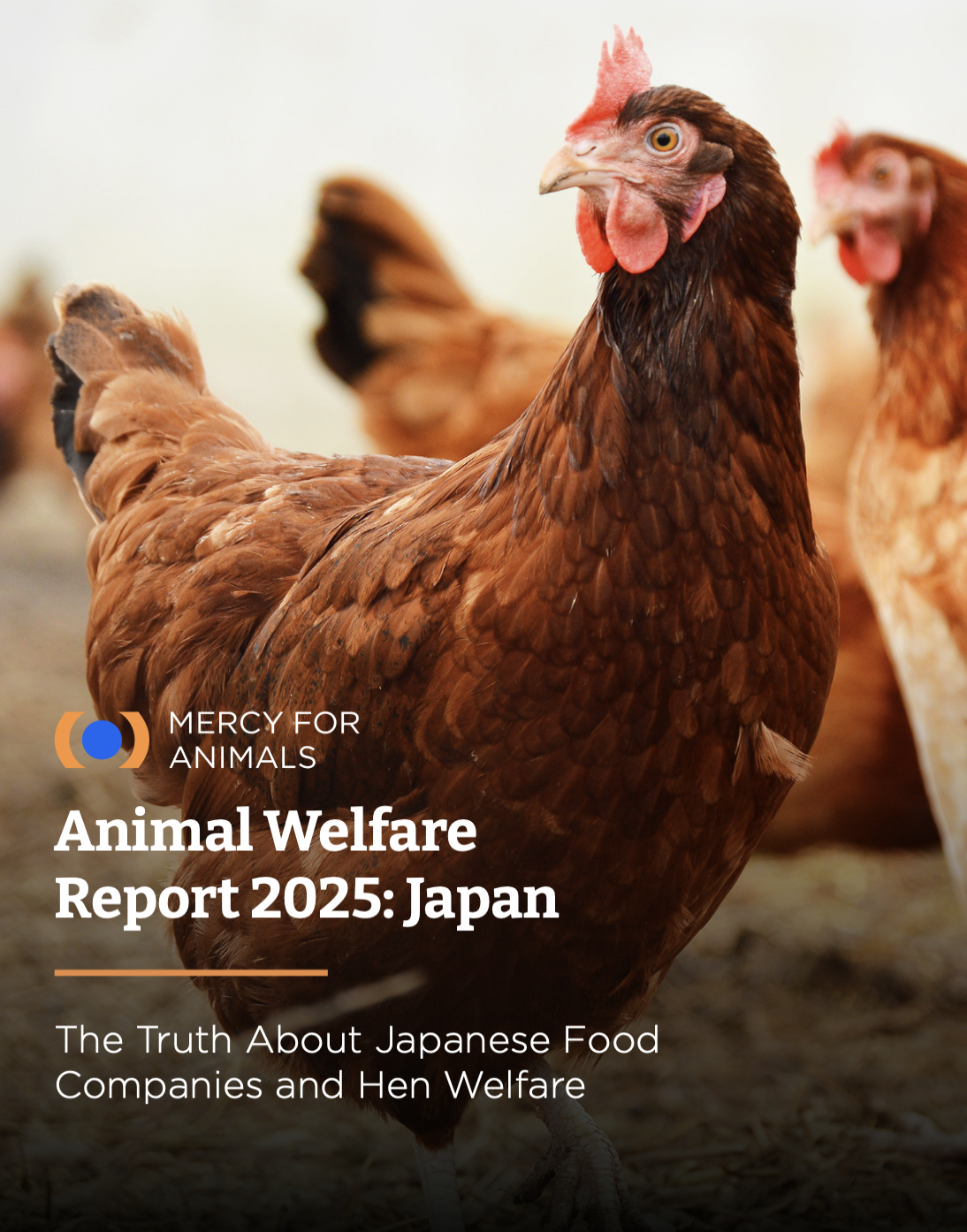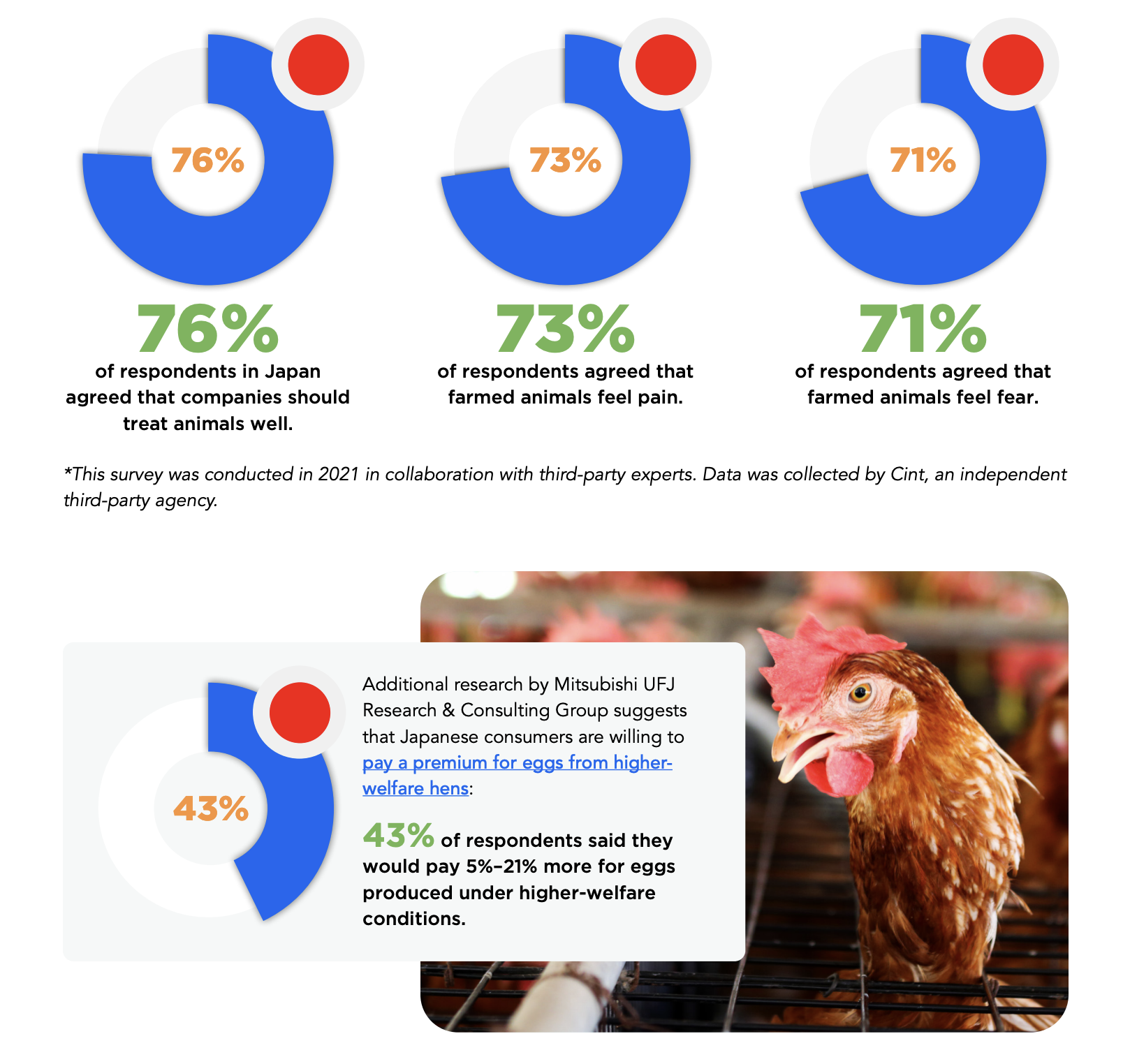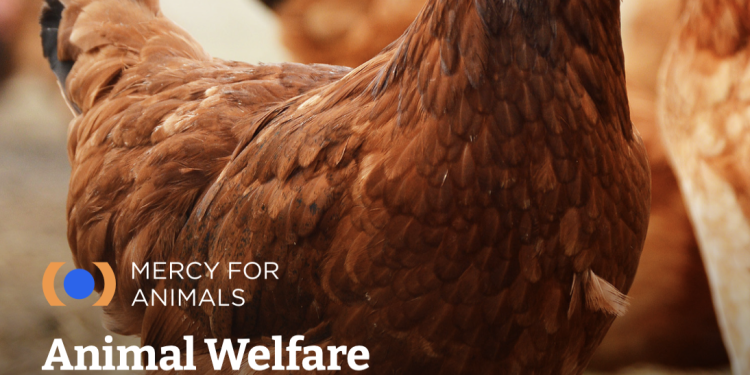This month, Mercy For Animals released their inaugural Animal Welfare Report 2025: Japan, the first report to evaluate cage-free egg commitments among Japan’s top food companies. The findings? While a few companies are stepping up, the majority are falling far behind, demonstrating the pressing need for Japanese companies to keep up with rising global animal-welfare standards and consumer expectations.

An estimated 95% of hens in Japan still spend their lives in battery cages—wire enclosures so small that the animals can’t spread their wings. This confinement system is inherently cruel, causing injury, disease, and extreme stress while denying hens the ability to perform natural behaviors, like nesting and dustbathing. The science is clear: Compared with cages, cage-free housing reduces pain, stress, and disease.
Around the world, hundreds of global food companies have committed to going cage-free, many pledging to complete the transition by the end of 2025. Yet in Japan, most companies lag far behind. These include Japan-based companies that operate abroad, whose cage-free commitments extend only to countries outside Japan, even though hens around the globe deserve fair treatment.
Cage-free policies not only align with higher welfare standards in the supply chain but with higher consumer standards in Japan and across Asia:
- 43%—Japanese consumers surveyed who said they would pay more for cage-free eggs.
- 77%—South Korean consumers surveyed who believe companies should ensure farmed animals’ needs are met.
- 72.3%—Chinese consumers surveyed who care whether hens suffer in egg production.

Asia is the world’s largest egg producer, accounting for about 64% of global production. Japan has an enormous opportunity to lead critical welfare change, not only locally but across the Asia-Pacific region.
Which Food Companies Are Making Positive Changes?
Danone, a France-based multinational food manufacturer, has a global cage-free commitment that includes the company’s Japanese operations. The company achieved 100% global cage-free sourcing in 2020.
Japan’s leading mayonnaise manufacturer has committed to increasing the use of cage-free eggs in Kewpie mayonnaise, a popular product globally, from the current 3% to 10% by 2027.
The company has also expressed interest in using cage-free credits for their Asian markets.
Costco Japan
This United States-based Costco brand has a global cage-free commitment that includes their operations and retail locations in Japan. Costco Japan sells cage-free eggs at their stores and is reporting progress on their 100% cage-free goal.
Which Food Companies Are Falling Behind?
Seven & i Holdings, known best for 7-Eleven, their global convenience-store chain, is a multinational retailer headquartered in Japan. They sell cage-free eggs in some retail locations in Japan, yet the company’s current cage-free statement extends only to their locations in the United States and Canada. Seven & i can build on their current statement by extending their cage-free commitment to their stores in Japan.
Zensho Holdings
Zensho Holdings, one of the largest restaurant-chain operators in Japan and the greater Asia region, has no published statements or initiatives promoting hen welfare to date and should publish a global cage-free commitment.
Colowide, another major Japan-based foodservice company, operates over 20 brands in 15 regions. While the company uses cage-free eggs in some of their products, such as Colowide’s SilsMaria brand for baked goods, they have not publicly disclosed the percentage of cage-free eggs in their global supply. Colowide could be more transparent by sharing this data and publishing a global cage-free commitment that includes Japan.
Lawson, a competitor of Seven & i, operates a convenience-store franchise that mainly operates in the Asia-Pacific region, with a major presence in Japan, does not have a global cage-free commitment. They previously sold a product containing cage-free eggs but for a limited time only.
Why This Matters
Japan is already ranked one of the lowest among G7 nations for farmed animal protection, and the country’s biggest companies have consistently scored poorly on global animal welfare benchmarks. Without decisive action, Japan risks falling even further behind, jeopardizing its international reputation for quality and responsibility.
The good news? Change is possible. Other Asia-based companies, like Jollibee (Philippines), Super Indo (Indonesia), and Carrefour (Taiwan), have already pledged to go 100% cage-free, proving that progress is both achievable and impactful in Asia.
Take Action!
Hens in Japan deserve better. Corporate leaders must take responsibility and publish time-bound global cage-free commitments.
Read the full Animal Welfare Report 2025: Japan, and join us in calling on companies to step up, take action, and lead the way toward a kinder food system.





![Cimetidine Coupon for Pets [2026] Cimetidine Coupon for Pets [2026]](https://dogtrainingtips.bid/wp-content/uploads/2026/01/Cimetidine-Coupon-for-Pets-2026-120x86.jpg)



Discussion about this post